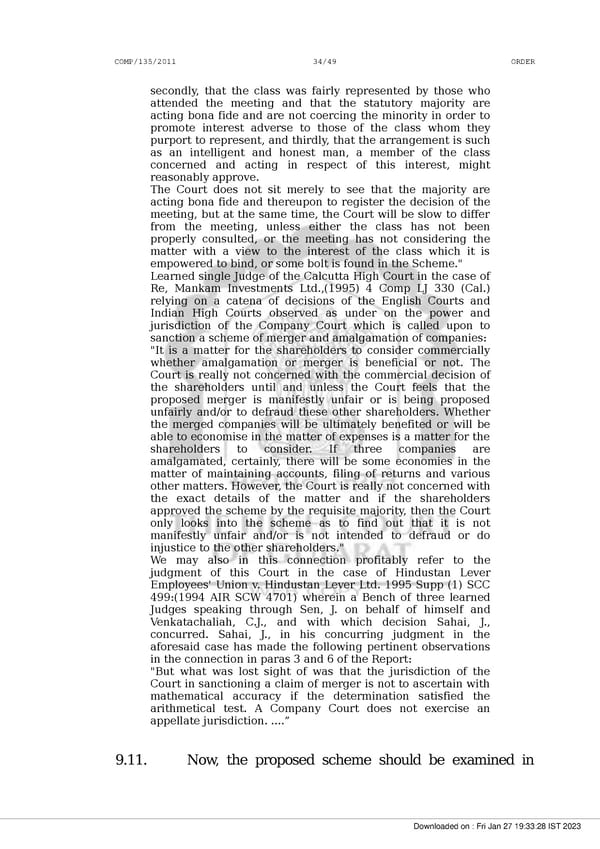COMP/135/2011 34/49 ORDER secondly, that the class was fairly represented by those who attended the meeting and that the statutory majority are acting bona fide and are not coercing the minority in order to promote interest adverse to those of the class whom they purport to represent, and thirdly, that the arrangement is such as an intelligent and honest man, a member of the class concerned and acting in respect of this interest, might reasonably approve. The Court does not sit merely to see that the majority are acting bona fide and thereupon to register the decision of the meeting, but at the same time, the Court will be slow to differ from the meeting, unless either the class has not been properly consulted, or the meeting has not considering the matter with a view to the interest of the class which it is empowered to bind, or some bolt is found in the Scheme." Learned single Judge of the Calcutta High Court in the case of Re, Mankam Investments Ltd.,(1995) 4 Comp LJ 330 (Cal.) relying on a catena of decisions of the English Courts and Indian High Courts observed as under on the power and jurisdiction of the Company Court which is called upon to sanction a scheme of merger and amalgamation of companies: "It is a matter for the shareholders to consider commercially whether amalgamation or merger is beneficial or not. The Court is really not concerned with the commercial decision of the shareholders until and unless the Court feels that the proposed merger is manifestly unfair or is being proposed unfairly and/or to defraud these other shareholders. Whether the merged companies will be ultimately benefited or will be able to economise in the matter of expenses is a matter for the shareholders to consider. If three companies are amalgamated, certainly, there will be some economies in the matter of maintaining accounts, filing of returns and various other matters. However, the Court is really not concerned with the exact details of the matter and if the shareholders approved the scheme by the requisite majority, then the Court only looks into the scheme as to find out that it is not manifestly unfair and/or is not intended to defraud or do injustice to the other shareholders." We may also in this connection profitably refer to the judgment of this Court in the case of Hindustan Lever Employees' Union v. Hindustan Lever Ltd. 1995 Supp (1) SCC 499:(1994 AIR SCW 4701) wherein a Bench of three learned Judges speaking through Sen, J. on behalf of himself and Venkatachaliah, C.J., and with which decision Sahai, J., concurred. Sahai, J., in his concurring judgment in the aforesaid case has made the following pertinent observations in the connection in paras 3 and 6 of the Report: "But what was lost sight of was that the jurisdiction of the Court in sanctioning a claim of merger is not to ascertain with mathematical accuracy if the determination satisfied the arithmetical test. A Company Court does not exercise an appellate jurisdiction. ....” 9.11. Now, the proposed scheme should be examined in Downloaded on : Fri Jan 27 19:33:28 IST 2023
 Adani Response Page 383 Page 385
Adani Response Page 383 Page 385